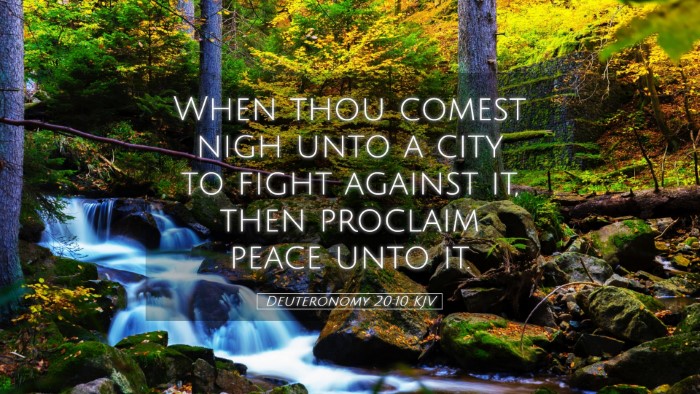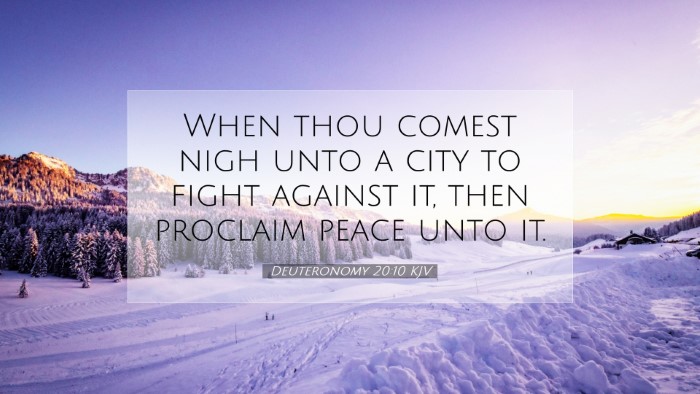Commentary on Deuteronomy 20:10
Verse Overview: Deuteronomy 20:10 reads, "When you go to war against your enemies and see horses and chariots and an army greater than yours, do not be afraid of them, because the LORD your God, who brought you up out of Egypt, will be with you."
Introduction
This verse is part of a larger discourse regarding Israel’s conduct in warfare, emphasizing trust in God’s presence and power. The directives given here illuminates not only a historical context for Israel’s military practices but also reveals profound theological truths applicable to the followers of God’s covenant.
Commentary Insights
1. The Call to Engage in Warfare
Matthew Henry reflects on the necessity of engaging in warfare when affronted by enemies. He notes that God allows His people to defend themselves, distinguishing righteous wars from those of aggression. This indicates that God's command for Israel to engage in battle was not merely an endorsement of violence but rather a necessary action for their survival and fulfillment of divine purpose.
2. Facing Overwhelming Odds
Albert Barnes emphasizes the context in which the Israelites might find themselves—facing formidable foes with superior military assets. The mention of "horses and chariots," symbols of power and might in ancient warfare, serves to incite fear due to their technological advantage. However, Barnes insists that the greater lesson is the assurance of divine support, which supersedes any earthly might.
3. The Foundation of Faith
Adam Clarke insists that the encouragement to not be afraid is rooted in the knowledge and experience of God's faithfulness. God's actions, such as liberating Israel from Egypt, serve as a foundation for bolstering their faith in times of distress. It speaks to the intrinsic relationship between remembering God’s past deeds and building courage for present and future challenges.
Theological Implications
1. Divine Presence in Battle
The assurance that "the LORD your God will be with you" underscores the belief that God is actively involved in the affairs of His people, especially in times of trial. This offers profound encouragement to believers today, suggesting that while they may face daunting obstacles, their battles are not fought in isolation. The presence of God transforms the nature of the conflict.
2. Courage in Adversity
The verse serves as a template for understanding courage in the face of adversity. Matthew Henry articulates how believers can face external threats with confidence, anchored in the reality of God’s promise. The spiritual application here is vast; believers are encouraged to confront their fears with faith, knowing that they have divine backing in their endeavors.
3. Remembering God’s Faithfulness
Clarke touches on a critical point: the recollection of God’s past interventions serves as a powerful motivator for faithfulness amid adversity. This creates a framework where past experiences of divine help encourage present trust. Such remembrance can lead to a sustained faith life, catalyzing the believer's courage in subsequent challenges.
Practical Applications
-
Faith in Action:
In pastoral ministry, practitioners can encourage congregants to remember God's past faithfulness as they face current fears and uncertainties. Just as Israel was called to remember their exodus, modern believers should be reminded of their own spiritual milestones.
-
Preaching Upon Assurance:
Sermons can derive from this verse the importance of trusting in God in the midst of overwhelming circumstances. The emphasis on divine support invites congregations to reflect on their reliance on God, particularly in what seem like insurmountable challenges.
-
Equipping for Battle:
Spiritual warfare is prevalent in theological discourse. This verse can be utilized to teach congregants about the principles of dealing with challenges—they need to rely on God’s strength, preparing themselves through prayer, community support, and Scripture.
Conclusion
Deuteronomy 20:10 provides a rich framework for understanding God’s involvement during times of conflict. Through public domain commentaries by Matthew Henry, Albert Barnes, and Adam Clarke, we see the multifaceted nature of this verse that speaks to historical, theological, and practical elements of faith. As believers reflect on their challenges, the admonition to not fear is a profound assurance that resonates through centuries of faith, echoing the reassurance of God's unyielding presence and might in every battle faced.


